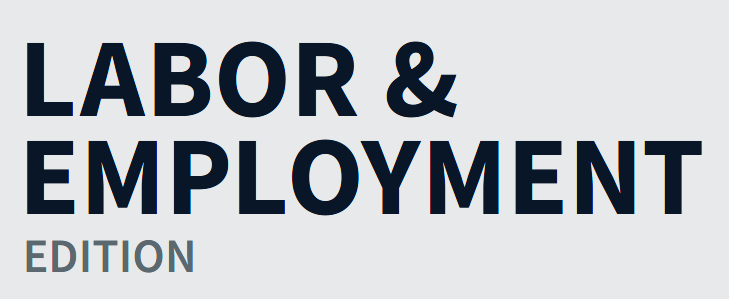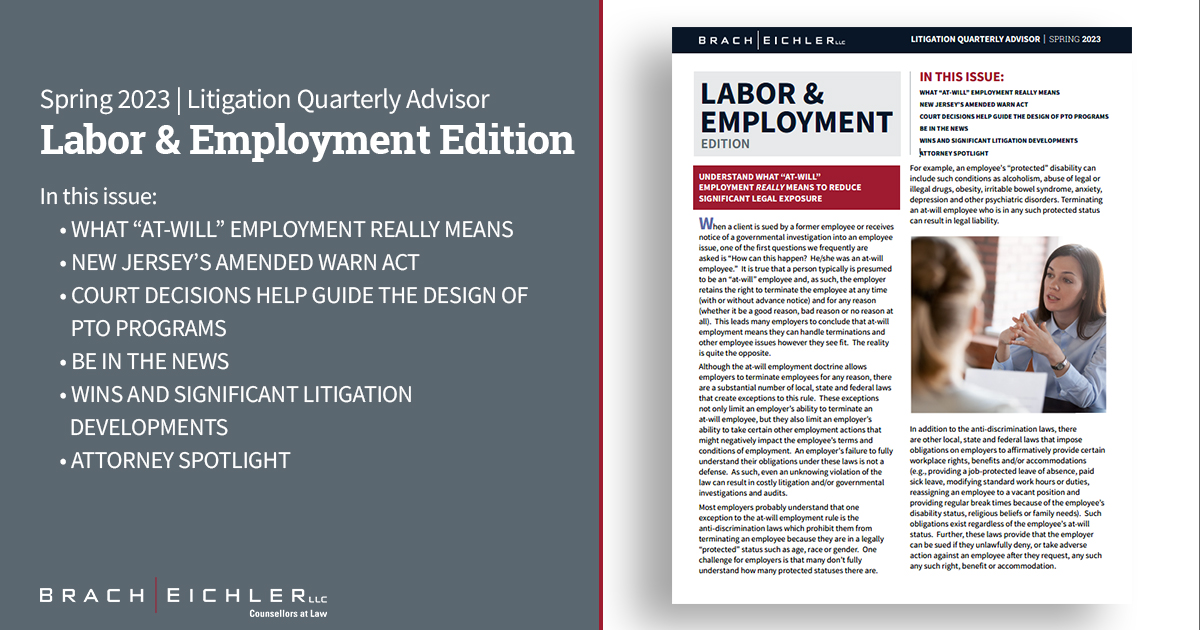

When a client is sued by a former employee or receives notice of a governmental investigation into an employee issue, one of the first questions we frequently are asked is “How can this happen? He/she was an at-will employee.” It is true that a person typically is presumed to be an “at-will” employee and, as such, the employer retains the right to terminate the employee at any time (with or without advance notice) and for any reason (whether it be a good reason, bad reason or no reason at all). This leads many employers to conclude that at-will employment means they can handle terminations and other employee issues however they see fit. The reality is quite the opposite.
Although the at-will employment doctrine allows employers to terminate employees for any reason, there are a substantial number of local, state and federal laws that create exceptions to this rule. These exceptions not only limit an employer’s ability to terminate an at-will employee, but they also limit an employer’s ability to take certain other employment actions that might negatively impact the employee’s terms and conditions of employment. An employer’s failure to fully understand their obligations under these laws is not a defense. As such, even an unknowing violation of the law can result in costly litigation and/or governmental investigations and audits.
Most employers probably understand that one exception to the at-will employment rule is the anti-discrimination laws which prohibit them from terminating an employee because they are in a legally “protected” status such as age, race or gender. One challenge for employers is that many don’t fully understand how many protected statuses there are.
For example, an employee’s “protected” disability can include such conditions as alcoholism, abuse of legal or illegal drugs, obesity, irritable bowel syndrome, anxiety, depression and other psychiatric disorders. Terminating an at-will employee who is in any such protected status can result in legal liability.

In addition to the anti-discrimination laws, there are other local, state and federal laws that impose obligations on employers to affirmatively provide certain workplace rights, benefits and/or accommodations (e.g., providing a job-protected leave of absence, paid sick leave, modifying standard work hours or duties, reassigning an employee to a vacant position and providing regular break times because of the employee’s disability status, religious beliefs or family needs). Such obligations exist regardless of the employee’s at-will status. Further, these laws provide that the employer can be sued if they unlawfully deny, or take adverse action against an employee after they request, any such any such right, benefit or accommodation.
There also are laws that prohibit various types of retaliation. For example, employers are subject to liability for terminating at-will employees that make “protected” complaints. Some examples of “protected” complaints include employees who complain about workplace safety, harassment/hostile work environment, equal pay, failure to pay overtime, violation of privacy rights and violations of other laws, rules and regulations.
Most employers act in good faith, but many still suffer from a common misunderstanding about what at-will employment really means. Unfortunately, it does not mean much. If employers want to reduce the risk of legal claims, what they must realize is that at-will employment means that employers have significant obligations to such employees and that they are not free to take whatever action they deem is reasonable under the circumstances.
So what can employers to do reduce their legal risks? Here are a few tips:
• Before taking action that may deemed adverse by the employee, consider potential obligations under applicable law
• Don’t fall into the trap of believing you can defend an employment action simply on the basis that the employee was “at-will”
• Prior to taking an adverse employment action (whether that action be termination, demotion, transfer, denial of workplace accommodation or other action), be sure you can articulate a legitimate non-discriminatory/non-retaliatory reason for taking the action/inaction
• Document employee performance issues and other problems as they arise
• Follow progressive discipline (if appropriate)
• Be consistent in treatment of employees
• Know your limits . . . Ask for outside help/legal counsel if needed
For more information, contact:
Matthew Collins | 973.403.3151 | mcollins@bracheichler.com
New Jersey’s WARN Act requires employers to give their employees advance notice of mass layoffs or similar actions that would result in a substantial reduction in force if certain triggering criteria are met. Failure to provide the required advance notice subjected employers to the penalty of having to pay a terminated employee severance.
Some of the most significant changes to the New Jersey WARN Act are as follows:
• Companies with over 100 employees are now obligated to comply, irrespective of the number of hours the employees work or how long they have been employed with the company. There is no longer a distinction between full time and part employees and exclusion of employees tenured for less than six months has been eliminated.
• The threshold for a “mass layoff” has been reduced substantially. Previously a mass layoff was triggered by the termination of (i) 50 or more employees comprising 1/3 of the workforce at the establishment; or (ii) 500 or more employees. Under the new law, a mass layoff means the termination of 50 or more employees at a covered establishment in a 30-day period.
• The scope of employees that are counted toward the 50-employee threshold for a “mass layoff” has been expanded. Previously, the threshold for a mass layoff included 50 or more employees only “at” the establishment. Now, employees “at” the establishment and “reporting to” the establishment are counted, which also includes employees working remotely both in New Jersey and in other states as well.
• The definition of a covered “establishment” has also been expanded to include a non-contiguous group of locations within the State, whereas it previously only applied to contiguous worksites. This amendment appears to be targeting retail companies with multiple locations in New Jersey, but it is still not clear how this could apply to largely or entirely remote workforces.
• The 60 days advance notice requirement for a mass layoff was extended from 60 days to 90 days.
• Paying a terminated employee severance is no longer a penalty for failing to provide the required notice. Instead, each terminated employee must be paid one week’s pay for each full year of service, irrespective if advance notice was provided.
• If the company fails to provide the requisite advance notice, each employee must be paid an additional four weeks’ severance pay.

When a company is obligated to provide its terminated employee with notice, the notice must be made in writing, state the reason for the termination, the number of other employees that were also terminated, and the rights available to the employee under the termination. Notice must be provided to all affected employees at least 90 days before the first termination occurs. In the event that the employer fails to properly provide notice, the employee is entitled to one week of severance pay for each full year of employment. The rate of pay for the purposes of severance the higher of wither the final regular rate of pay at termination or the average rate of pay over the course of the employee’s last three years of employment.
The New Jersey WARN Act also permits former employees to bring lawsuits against their former employers. If successful, these employers can be liable for to their former employees for compensatory damages, claims for lost wages (capped at the amount of severance pay required), benefits, other remuneration and reasonable attorneys’ fees and costs, which can be in addition to any remedies available under the federal WARN ACT. If a company violates both the federal WARN Act and the New Jersey WARN Act, the employee can recover the higher amount of damages available under both of these laws.
Further, failure to comply with the notice and severance provisions of the New Jersey WARN Act creates personal
liability for “any person or group of persons acting directly or indirectly in the interest of an employer.” This includes any person who functions as the nominal employer, owns a corporate subsidiary that owns and operates the nominal employer, or makes the decision that gives rise to the mass layoff or termination or transfer of operations. For those who fall within this expanded definition of “employer,” it is unclear if the definition of severance constitutes “wages,” which could then place this individual on the hook for treble damages (triple the amount of severance) in a lawsuit brought by the employee.
For more information, contact:
Eric Magnelli | 973.403.3110 | emagnelli@bracheichler.com
Two recent court decisions should provide New Jersey employers with greater legal comfort about their employee paid time off programs. Employers voluntarily adopt these programs – for vacation or illness or other leaves like jury duty and bereavement – as part of a total rewards package to recruit and retain talent. (Some paid time off is required by the New Jersey Earned Sick and Safe Leave Law and these two cases did not address state-mandated paid leave.) What employers don’t expect is to be penalized for having these programs. Surprisingly, however, the law had been relatively unsettled about the enforceability of such programs and there continues to be some risk even after these decisions that all employers should consider in connection with these programs.
The issue in both of these cases was whether paid time off (PTO) were “wages.” In one case, the question arose under the New Jersey Wage Payment Law. If PTO were wages and if an employer did not pay out to an employee all earned PTO at the end of employment, then the employer would have violated the New Jersey Wage Payment Law. In the other case, the question arose under federal wage and hour law (i.e., the Fair Labor Standards Act). If PTO were wages and if an employer reduced a salaried employee’s amount of PTO based upon performance or hours worked, then there would have been an improper reduction in the employee’s base salary thereby making the employee retroactively eligible for overtime.
Both courts concluded that PTO were not wages under these laws, using different reasoning but arriving at the same common sense conclusion.
Favorable litigation outcomes do not mean risk free decision-making for employers. The court decision about the New Jersey Wage Payment Law, for example, is not precedential, could be appealed, and addressed only the specific terms of one PTO program. Moreover, PTO programs still need to be carefully drafted because failing to follow the terms of a program could generate a breach of contract claim or ostensible proof of discrimination from a dissatisfied employee. Therefore, employers should carefully review their written PTO programs for clarity and consistency and their general employee handbook disclaimers.
For more information, contact:
Jay Sabin | 917.596.8987 | sabin@bracheichler.com
Advances in drug testing have been in the news lately, particularly for New Jersey employers. In February, New Jersey’s highest court favorably received a special master report that concluded, that although a test of bodily fluids cannot scientifically identify whether the person is impaired from cannabis use, a properly trained “Drug Recognition Expert” applying a twelve-step protocol could reliably determine whether a person is impaired. (The case is actually still open, as the special master has been directed to use a slightly different formulation to determine the admissibility of such evidence in civil and criminal actions.) In May, the U.S. Federal Motor Carrier Safety Administration formally approved the use of saliva to test for the presence of prohibited drugs, including cannabis, among regulated truck drivers. One of the great advantages of saliva testing, as compared to urine testing, is that a saliva test will generally detect cannabis within the past 24 hours whereas urine samples detect cannabis use generally during the prior 3 to 67 days.
Sounds like cannabis testing should be in a New Jersey employer’s wheelhouse. Not so fast. New Jersey’s 2021 law legalizing adult use of cannabis contains two critical prohibitions. First, employers may not test for cannabis without first conducting a “physical evaluation in order

to determine an employee’s state of impairment” done by a person officially certified as a “Workplace Impairment Recognition Expert.” No such person yet exists because the New Jersey Cannabis Regulatory Commission has yet to establish the standards for such certification. Second, no “adverse action” may be taken against an employee “solely due to the presence of cannabinoid metabolites in the employee’s bodily fluid from engaging in conduct permitted under” the adult cannabis use law. Recently, a federal judge applied this latter principle in opining that an employer could not legally terminate an employee solely based upon drug test results showing cannabis use.
There are exceptions to these principles for employers required to test for cannabis by federal regulation (such as a commercial motor vehicle operators) or pursuant to federal contract.
For a more in-depth discussion about this evolving area of the law, please refer to our prior legal alerts.
For more information, contact:
Jay Sabin | 917.596.8987 | sabin@bracheichler.com
Many times, employers are frustrated by the lack of a clear answer from their employment lawyer on a myriad of issues ranging from candidate screening, background checks, offer letters, discipline and, when necessary, terminations. The lack of clarity often stems from an unclear statute or regulation, which results in litigation, which results in a not-always-clearer judicial interpretation of the ambiguity in the first place.
But one area of the law that has been relatively stable for many years is paycheck deductions. This may seem like a more mundane issue easy to get right, but there are painful financial consequences for employers who get this wrong in addition to potential criminal charges. Not a week goes by when an employer client calls and asks “can I deduct ________________ from my employee’s paycheck?” Most times, the answer is clear cut, yes or no. But it is always a good time for a refresher on permissible (and not permissible) deductions from an employee’s paycheck. And these rules apply to every employer in New Jersey regardless of size.

Impermissible Deductions
There is a bright line rule that all employers can follow in New Jersey. That is: employers cannot “withhold or divert”(i.e., deduct) any portion of an employee’s wages from the paycheck unless expressly permitted. As a practical matter, that means if you do not see the deduction you want to make in the section below on Permissible Deductions, you cannot make the deduction from the paycheck.
Making impermissible deductions from wages can result in the employer as well as the officers or agents of the entity having management of the employer (i.e., personal
Separate from the financial penalties, an employer who knowingly and willfully makes impermissible deductions from wages is guilty of a disorderly person’s offense which, if convicted, is subject to a fine of not less than $100 nor more than $1,000.
liability). Where the New Jersey Department of Labor & Workforce Development (“DOL”) Commissioner investigates violations, he has the power to not only compel payment to the Commissioner of the unlawfully deducted wages, but to charge an administrative fee of at least 10% and as much as 25% of the amount of unlawfully deducted wages. And on top of that, the DOL can assess an administrative penalty of $25 to $500 for each violation. Separate from the financial penalties, an employer who knowingly and willfully makes impermissible deductions from wages is guilty of a disorderly person’s offense which, if convicted, is subject to a fine of not less than $100 nor more than $1,000. Further, each impermissible deduction is a separate and distinct offense. So, if you are making an unlawful deduction from 100 employees’ paychecks, the money you will owe = A LOT.
Permissible Deductions
So, what can an employer deduct from an employee’s paycheck? Below is a broad stroke list of the categories of permissible deductions. The full list is found at N.J.A.C. 12:55-2.1(2) and you should consult the full list as well as consult with your attorney before acting.
If it is not on this list, you cannot deduct it from wages. And no, you cannot deduct from an employee’s wages even if they agreed to it in writing if it is not in the permissible list below.
For more information, contact:
Anthony Rainone | 973.364.8372 | arainone@bracheichler.com

Brach Eichler LLC is pleased to announce the selection of 30 of the firm’s attorneys for inclusion in the “2023 New Jersey Super Lawyers” list by Super Lawyers®. Congratulations to Edward P. Capozzi, Matthew M. Collins, Riza I. Dagli, Lani M. Dornfeld, Susan Dromsky-Reed, John D. Fanburg, Stuart M. Gladstone, Joseph M. Gorrell, Carol Grelecki, Alan R. Hammer, Thomas Kamvosoulis, Eric Magnelli, Allen J. Popowitz, Anthony M. Rainone, David J. Ritter, Keith J. Roberts, Carl J. Soranno, Frances B. Stella, and Rose A. Suriano. The 10 attorneys from the firm included in the “2023 New Jersey Rising Stars” list by Super Lawyers® are: Eric Alvarez, Alex S. Capozzi, Shannon Carroll, Corey A. Dietz, Emily J. Harris, Jeremy L. Hylton, Daniel G. Leone, Robyn K. Lym, Kristen E. Marinaccio, Kristofer C. Petrie, and Michael A. Spizzuco, Jr.
On April 11, Litigation Member Rose Suriano, were recognized by NJBIZ as 2023 “Leaders in the Law.” Honorees were chosen by a panel of independent judges based on legal professionals whose dedication to their occupation and to their communities is outstanding.
On April 14, Brach Eichler Members Edward P. Capozzi, Susan Dromsky-Reed, Stuart M. Gladstone, David J. Ritter, Sean A. Smith and Carl J. Soranno, were recognized by NJ Family Magazine as “Best NJ Lawyers for Families.” On March 11, Employment Law Co-Chair Anthony Rainone, attended the NJBIA Employment and Labor Policy Committee Meeting and presented three major employment law issues for New Jersey businesses to be aware of in 2023.
Join us for the 12th Annual New Jersey Healthcare Market Review, September 28-29, 2023 at the Borgata Hotel Casino & Spa, Atlantic City, NJ! Connect with over 200 attendees comprised of hospital and ASC executives and stakeholders, physicians, practice owners/managers, and healthcare administrators. During this two-day event, industry experts will discuss timely topics and trends in the healthcare and legal space ranging from legislative issues to operating and business strategies for greater profitability. To learn more and register, please visit www.njhmr.com. For questions or additional information, please reach out to Ilana Schackman at ischackman@bracheichler.com.
WINS AND SIGNIFICANT BRACH EICHLER LITIGATION DEVELOPMENTS
Welcome Edward D. Altabet and Andrew Macklin, new members in the Litigation practice. Edward D. Altabet’s
practice focuses on high-stakes and high-risk litigation across many sectors, including financial services, banking,
wealth management, technology, manufacturing, export/import, construction, and real estate. He also handles
commercial litigation and investigations, resolving commercial and civil disputes and lender and creditor rights
is a core part of his practice. Andrew Macklin focuses his practice on construction litigation, complex commercial
litigation, consumer protection and probate disputes. He also represents clients in personal injury and
malpractice matters.
Konstantine Paschalidis obtained full dismissal on a motion to dismiss all claims against the Firm’s client, an
individual alleged to be the owner of a property who through construction caused hundreds of thousands of dollars
in damages to the plaintiffs’ adjacent property, based on the documentary evidence establishing that the LLC was the
owner and that there were no proper claims to pierce the corporate veil.
Get to know the faces and stories of the people behind the articles in each issue. This month, we invite you to meet Member Matthew M. Collins and Member Jay Sabin.
MATTHEW M. COLLINS
As Co-Chair of Brach Eichler’s Labor and Employment Practice, Matthew Collins has extensive experience representing clients in all aspects of labor and employment law. He provides strategic counsel to clients on a wide range of labor and employment issues such as discrimination; harassment; whistleblowing; discipline and discharge; layoffs; collective bargaining agreements; reasonable accommodations for disabled employees; and compliance with state and federal family and medical leave acts and applicable wage and hour laws.
On the weekends, Matt enjoys attending his kids’ sporting events and taking walks with his dog. During the summer, he looks forward to fishing, boating and crabbing.
JAY SABIN
When clients ask “how can I effectively handle a workplace problem, ”my decades of experience and extensive in-house experience quickly guide us to a practical solution. The question may be about equal treatment, fair pay, time off from work, rightsizing staff, separation agreements, the need to accommodate, costly health insurance, pension plan investments, senior management bonus plans, or phantom equity. The answer is . . . there is always an answer. In Jay’s spare time, he likes to avoid getting lost on long hikes and runs.

Attorney Advertising: This publication is designed to provide Brach Eichler LLC clients and
contacts with information they can use to more effectively manage their businesses. The contents
of this publication are for informational purposes only. Neither this publication nor the lawyers who
authored it are rendering legal or other professional advice or opinions on specific facts or matters.
Brach Eichler LLC assumes no liability in connection with the use of this publication.

Shannon Carroll | 973.403.3126 | scarroll@bracheichler.com
Matthew M. Collins | 973.403.3151 | mcollins@bracheichler.com
Riza I. Dagli | 973.403.3103 | rdagli@bracheichler.com
Charles X. Gormally | 973.403.3111 | cgormally@bracheichler.com
Bob Kasolas | 973.403.3139 | bkasolas@bracheichler.com
Thomas Kamvosoulis, Senior Editor | 973.403.3130 | tkamvosoulis@bracheichler.com
Andrew R. Macklin | 973.447.9670 | amacklin@bracheichler.com
Stuart J. Polkowitz | 973.403.3152 | spolkowitz@bracheichler.com
Anthony M. Rainone | 973.364.8372 | arainone@bracheichler.com
Richard B. Robins | 973.447.9663 | rrobins@bracheichler.com
Sean Alden Smith | 973.364.5216 | ssmith@bracheichler.com
Carl J. Soranno | 973.403.3127 | csoranno@bracheichler.com
Frances B. Stella | 973.403.3149 | fstella@bracheichler.com
Rose Suriano | 973.403.3129 | rsuriano@bracheichler.com
Hon. Lisa F. Chrystal, P.J.F.P.(Ret.) | 973.364.8359 | lchrystal@bracheichler.com
Anthony M. Juliano | 973.403.3154 | ajuliano@bracheichler.com
Theodore J. McEvoy | 973.364.5209 | tmcevoy@bracheichler.com
Thomas J. Spies | 973.364.5235 | tspies@bracheichler.com
Eric J. Boden | 973.403.3101 | eboden@bracheichler.com
Lindsay P. Cambron | 973.364.5232 | lcambron@bracheichler.com
Mark E. Critchley | 973.364.8339 | mcritchley@bracheichler.com
Paul J. DeMartino, Jr. | 973.364.5228 | pdemartino@bracheichler.com
Joseph D. Fanning | 973.364.8365 | jfanning@bracheichler.com
Emily J. Harris | 973.364.5205 | eharris@bracheichler.com
Robyn K. Lym | 973.403.3124 | rlym@bracheichler.com
Michael A. Rienzi | 973.364.5226 | mrienzi@bracheichler.com
Kelley M. Rutkowski | 973.364.5215 | krutkowski@bracheichler.com
Susan L. Schulman | 973.364.8333 | sschulman@bracheichler.com
Arnold G. Sooklall | 973.364.5223 | asooklall@bracheichler.com
Michael A. Spizzuco, Jr. | 973.364.8342 | mspizzuco@bracheichler.com
Lauren Adornetto Woods | 973.364.5211 | lwoods@bracheichler.com
Roseland, NJ | New York, NY | West Palm Beach, FL | www.bracheichler.com | 973.228.5700





